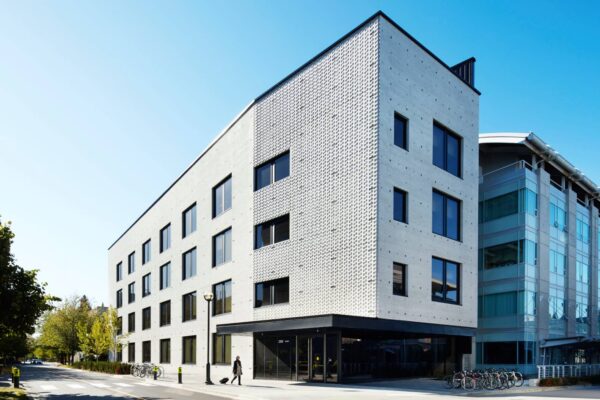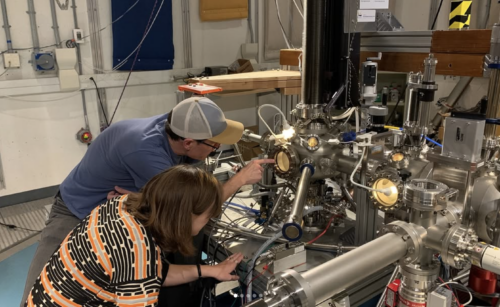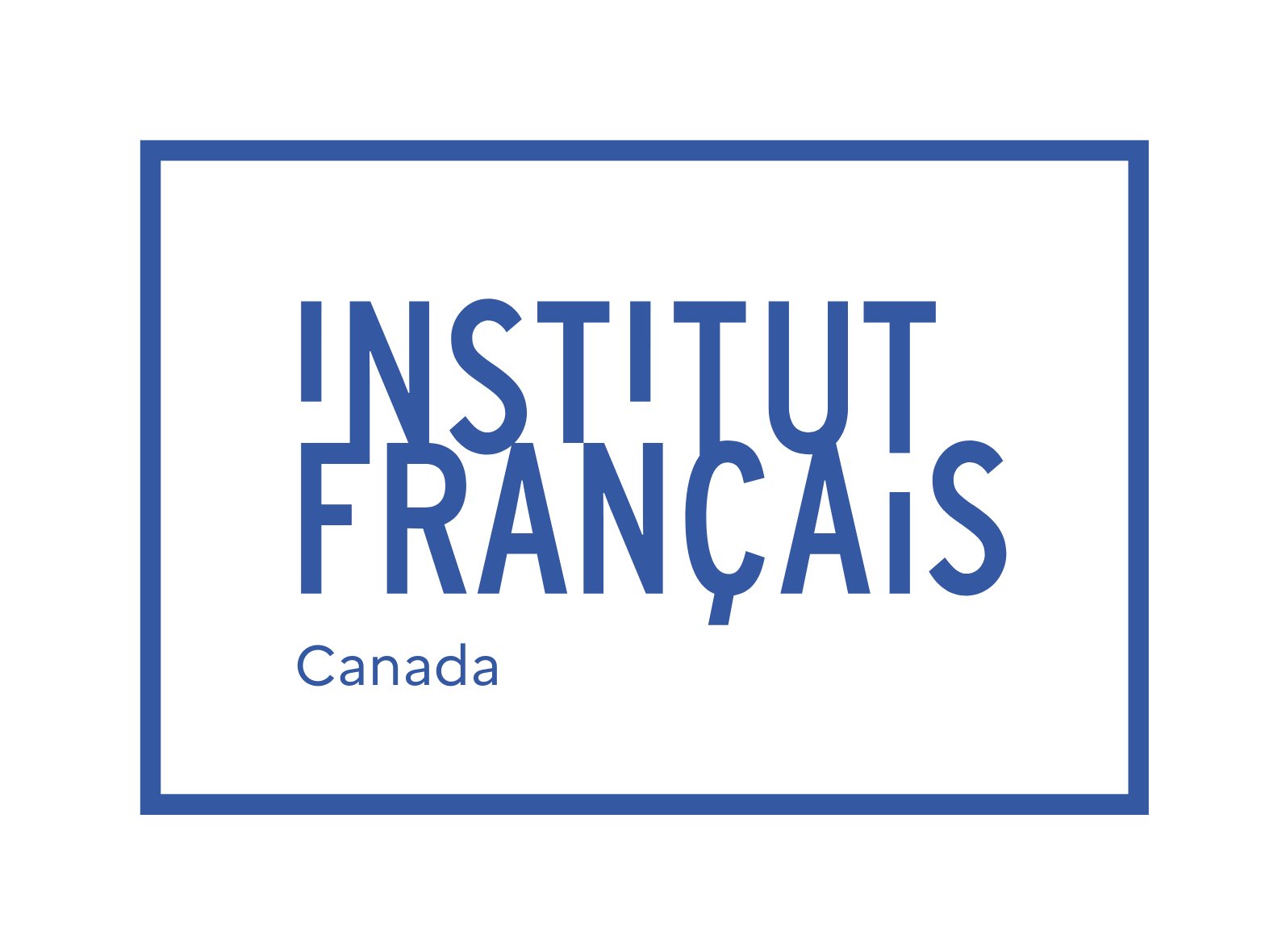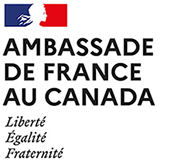Arts & Sciences Residency « Quantum Studio » in Vancouver – IIIrd Edition
October 8th to November 7th, 2025


The 2025 call for applications is now open!
Deadline: June 6th, 2025, at 11h59pm (Paris time)
1- About the Arts-Sciences Residency
1.1 – Introduction
The Institut français du Canada of the French Embassy in Canada, in partnership with the Stewart Blusson Quantum Matter Institute (QMI) and the Morris and Helen Belkin Art Gallery at the University of British Columbia (UBC), has launched the Arts-Sciences Residency program “Quantum Studio” in 2023 in Vancouver, British Columbia, Canada.
In 2025, declared International Year of Quantum Science and Technology by the United Nations, the third edition of this artistic residency will be launched. It will also take place in Vancouver and is aimed at a French artist exploring the intersections between the arts and quantum sciences.
Open to all artistic practices, the residency seeks to build exchanges between the artistic creation and quantum sciences (quantum physics, quantum computing, physics of the infinitely small, materials science, fundamental physics).
The Stewart Blusson Quantum Matter Institute and the Morris and Helen Belkin Art Gallery will provide the selected artist with a space in which artists and researchers can meet, discuss their practices, learn from each other, and reflect together on a creative project at the crossroads of the arts and sciences. Prior to the residency in Vancouver, several online meetings will be organised to establish and maintain initial contact between the winning artist in France and the host team (institutions and scientists) in Vancouver.
1.2 – Course of the residency
From October 8th to November 7th, 2025 in Vancouver, on the campus of the University of British Columbia (UBC).
1.3 – Objectives
- Foster or consolidate a creative project.
- Share their work at arts and science seminars co-organised with the Stewart Blusson Quantum Matter Institute and the Morris and Helen Belkin Art Gallery.
- Encourage discovery of Western Canada’s scientific and artistic ecosystems, as well as structuring collaborations between French and Canadian scientific and artistic institutions.
1.4 – Advantages
This program guarantees, in particular, to the laureate:
-
- 4 weeks of residence in Vancouver
- Accommodation on the UBC campus and a working office at the Stewart Blusson Quantum Matter Institute
- Round-trip airfare from France to Vancouver
- A €2,000 residency grant (corresponding to per diem and participation in three half-day lectures/master classes during the residency).
- Networking and connections with the local ecosystem
- Participation in three half-day lectures/master classes during the residency:
- A talk during the Stewart Blusson Quantum Matter Institute seminar
- A workshop at the Department of Art History, Visual Art & Theory of UBC
- A public event
2- Eligibility criteria
2.1 – Profile of the candidates
- Artist carrying an artistic project in writing or development,
- At least 18 years old,
- Resident in France for at least 5 years,
- Speaking English,
- Justifying first experiences of creation mixing arts and sciences (preference will be given to artists with a demonstrated engagement with quantum sciences).
2.2 – Accepted projects
This program is open to artistic practices in all their diversity (writing, visual and plastic arts, digital arts, design, dance, performance, immersive realities, sound creation, etc.).
In case of dance, for example, UBC doesn’t offer a studio facility.
3- Registration procedure
3.1 – About the call for application
The application submission:
- Must be done in English,
- In a single PDF,
- Must be sent by email to [email protected],
- Until June 6th, 2025 (11h59pm, Paris time).
3.2 – Required Information
To apply, we invite you to send the following documents:
- Application form: ENG_Application-Form-Art and science residency-2025
- A copy of your ID card or passport,
- A biography and a CV,
- A portfolio of previous projects (with video links, if applicable),
- A letter of motivation,
- A precise synopsis of the project, including a description of:
- the possible interactions with the local context (scientific and artistic scenes, cultural and natural context, etc.);
- the perspectives of the project after the residency (institutions which could support/exhibit/showcase, etc.);
- the impact of the residency for the artistic project.
- A projected work plan for the residency (forecast),
- Visuals of the project (if applicable),
- A letter of recommendation (mandatory).
- A letter from a French institution accompanying the project for a future exhibition or production of the work (mandatory).
4- Selection and commitments
4.1 – Selection of the committee
A professional selection committee will evaluate the eligible projects. Interviews with the shortlisted candidates will take place on June 13th and/or June 16th, between 5pm and 8pm (Paris time).
4.2 – Notification and official announcement
The laureate will be officially announced in the last week of June 2025. Beforehand, each applicant will have been notified by email of the selection committee’s decision regarding his or her application.
4.3 – Obligations of the laureate
A contract summarising all the commitments on both sides will be signed between the laureate and the program partners.
Before the residency, they commit:
- to transmit to the partners the work plan for the residency.
- to participate in some virtual meetings to prepare for the residency, between June and September inclusive.
During the residency, they commit to:
- Carry out the planned work schedule.
- Share their thoughts on the project with the partners (weekly meetings).
- Present the project at events organised by QMI, the Belkin Art Gallery and the French Embassy, on the UBC campus and outside.
- Exchange with the partners on the future of the project and its presentation following the end of the residency.
- To take time in Vancouver, before the end of the residency, to write a report on the residency with the Consulate’s teams on site. They must keep the partners informed of any developments or changes to the project before, during and after the residency itself.
After the residency, they commit:
- To present the creative developments of the project to the partners in autumn 2026.
Regarding communication, they commit:
- To display the logos provided by the partners in the project credits and on all communication media.
- To authorise the residency partners to communicate or present the project for promotional purposes as part of their programming.
5- Timeline
April 2nd, 2025: Opening of the call for applications.
June 6th, 2025 (11h59pm, Paris time): Deadline for applications.
June 13th and/or 16th, 2025: Interviews with the pre-selected candidates.
End of June, 2025: Notification of the results.
6- Contact
Please do not hesitate to contact us if you have any questions, at this address: [email protected]
7- Partners
The Institut français du Canada (IFC) of the Embassy of France in Canada
The first French diplomatic delegation in Canada was received as early as 1928, and the embassy building in Ottawa was inaugurated in 1939. Since then, the Service for Cooperation and Cultural Action (SCAC) of the Embassy of France in Canada has been working tirelessly to facilitate exchanges between the two countries, in areas as varied as cultural and creative industries (immersive realities, video games, books, etc. – which have become a major axis of cooperation), visual arts and live performance, artist residencies, academic mobility, and scientific cooperation (particularly in the themes defined as priorities by France and Canada: emerging technologies – quantum science and artificial intelligence -, oceanic and polar sciences, energy, and health), as well as educational cooperation. Since 2025, the French Embassy in Canada created the Institut français du Canada to strengthen our cooperation.
This cross-residency program is carried, in particular, by the IFC antenna based at the French Consulate General in Vancouver: it carries out its missions throughout the consular jurisdiction, namely British Columbia, Alberta, Saskatchewan, Yukon, and the Northwest Territories.
https://francecanadaculture.org/fr/residence-croisee-arts-sciences-quantum-studio/
“Quantum Studio” is part of a broader framework of residency programs initiated by the embassy in Western Canada, entitled “Les Résidences Ouest-Ouest”: in 2025, it will also offer creative residencies touching on immersive realities, and musical creation with IA.
University of British Columbia (UBC)
Ranked among the top 50 universities in the world (2nd in Canada), UBC is the oldest university in British Columbia. It has over 70,000 students (around 60,000 on the Vancouver campus and 12,000 on the Okanagan campus) and more than 5,000 researchers. The priority areas supported by research at UBC cover global themes such as:
- Advanced technologies : quantum sciences, artificial intelligence, etc.
- health
- The response to pandemics: One Health / Global Health
- The biodiversity crisis in relation to climate change: preservation of the oceans, marine biodiversity, preservation of forests, etc.
- Access to essential resources (water, clean energy, food)
- Art history and indigenous studies
Blusson Quantum Matter Institute (QMI)
As an institute specialising in research into materials, physics and quantum sciences in particular, the QMI brings together around fifty researchers and scientists and around 200 students (masters, PhD and post-doc). QMI is part of the CNRS IRN CAFQA network (launched in January 2023), which aims to bring together Canadian and French researchers working in the field of quantum sciences. The QMI is very open to the international scene and welcomes researchers of different nationalities (particularly French thanks to collaborations with PSL and Université de Grenoble Alpes). https://qmi.ubc.ca. QMI is one of the founding members of an interdisciplinary “Ars Scientia” program, bringing together researchers and artists from British Columbia: https://arsscientia.ubc.ca/
Morris and Helen Belkin Art Gallery
The Morris and Helen Belkin Art Gallery was founded in 1948 as the only venue in the Vancouver area devoted to contemporary art. Located on the UBC campus, it is a university gallery committed to developing research projects and houses the university’s art collection. Housed in an award-winning building designed by Anglo-Canadian architect Peter Cardew and inaugurated in 1995, it has one of the largest public art collections in British-Columbia (5,000 works), contributing to an understanding of the Canadian and Vancouver avant-garde of the 1960s and 1970s (painting, photography, concrete poetry, etc.). Each year, it presents 4 to 7 exhibitions by artists of national and international renown, in partnership with Canadian and foreign institutions, and works from the collection are presented as part of a thematic exhibition. An annual exhibition is also organized for graduates of UBC’s Master of Fine Arts program. https://belkin.ubc.ca/



